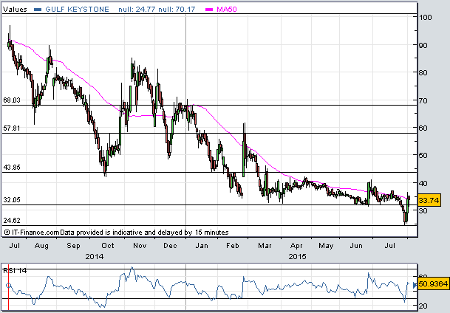Kurds offer Gulf Keystone payment hope
4th August 2015 12:11
by Lee Wild from interactive investor
So, it looks like Kurdish politicians are finally prepared to ramp up payments to international oil companies (IOCs) producing in the Kurdistan region. That's proved to be a much-needed shot in the arm for , which desperately needs to agree a regular payment cycle for oil from its vast Shaikan field.
"From September 2015 onwards, the Kurdistan Regional Government (KRG) will on a monthly basis allocate a portion of the revenue from its direct crude oil sales to the producing IOCs, to cover their ongoing expenses," said the Ministry of Natural Resources in a statement published by Gulf late Monday.
"Furthermore, as export rises in early 2016, the KRG envisages making additional revenue available to IOCs to enable them to begin to catch up on the past receivables due under their production sharing contracts."
Baghdad agreed early this year that the KRG could export crude oil in exchange for regular payments of the region's 17% revenue entitlement. But the Iraqis have not paid up, which explains why the Kurds have introduced direct crude oil sales from Ceyhan in southern Turkey. It's their main money spinner, so the closure of the Kirkuk-Ceyhan oil pipeline following a terrorist attack last week does not help.
The statement continued: "The KRG also recognises the patience of the producing IOCs, which, despite receiving hardly any payments for their crude oil production since May 2014, have maintained operations and have continued to invest to support Kurdistan's crude oil export.
"Crude oil export is the principal revenue earner for the Kurdistan Region. But, it is also recognised that it is difficult for the IOCs to sustain oil export at its current levels, let alone increase it as planned, without receiving their financial dues."

(click to enlarge)
That's all good news, and Gulf's new chief executive Jón Ferrier said it "represents a further important step towards the establishment of a regular payment cycle for Shaikan crude oil sales." It does, but we have little idea how much Gulf and others working in the region will receive. Oil industry expert Malcolm Graham-Wood remains pragmatic, but has a stab anyway.
"We all know that this is but an early and as yet unproven initiative and I suspect that payments will be of a fairly modest nature in the early stages. At this stage it is worth bearing in mind that there is a substantial backlog owed to the companies and this is but a tiny step, but for those who believed it might never happen and force companies into bankruptcy is a stay of execution if not better."
Gulf is due to announce half-year results on 27 August. We already know it had a $72.1 million cash pile last month, so any update on movements there will be interesting. Investors will be keen to here of progress on asset sales, too.
Gulf's share price hit a six-year low last week, a day before the company reported that a domestic offtaker had loaded much of the 43,700 barrels produced onto 240 trucks bound for the Turkish coast.
This article is for information and discussion purposes only and does not form a recommendation to invest or otherwise. The value of an investment may fall. The investments referred to in this article may not be suitable for all investors, and if in doubt, an investor should seek advice from a qualified investment adviser.